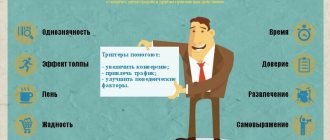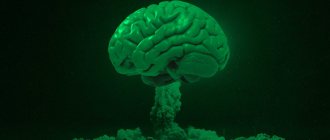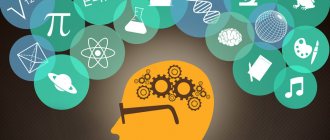Science, despite its high level of development, currently does not know much about the biological nature of creativity. Creativity in a technical context is still an ephemeral substance that is difficult to measure, and therefore difficult to predict and take under strict control. But, unlike creativity, its source, the brain, lends itself to active study. Today, scientists are only lifting the curtain of secrecy, but are already confident that the flexibility of the brain, like the flexibility of the body, is improving. This means that a person, having in his arsenal the levers to control thinking, can expand its scope. And everyone is capable of letting their imagination go into an endless flight filled with bright colors, giving up cramped boundaries.
Definition of the concept
In psychology, mental flexibility is a person’s ability to revise his decisions and conclusions when conditions change. In addition, this concept means the absence of any patterns used in solving life problems, as well as preconceived opinions.
People who lack such qualities are characterized by mental inertia. They think and act only according to models and are afraid of everything new.
In order to finally understand what mental flexibility is, it is necessary to consider how it is expressed in humans. After all, if a person is able to approach life intelligently, then this will certainly be reflected in the way of thinking.
Moreover, flexibility of thinking is also a person’s ability to clearly see the current situation, as well as predict its further development. What are the signs of the presence of such a characteristic in a person?
What is it about?
The mind is said to be full of flexibility if a person is able to quickly identify patterns and mutual connections between the objects with which he has to work. Such a person is able to formulate associative connections; it is not difficult for her to evaluate all possibilities and act taking them into account. If a careful analysis of one’s daily routine and a critical assessment of oneself give a person a disappointing result, one should not be upset, because this personality quality can be developed.
People say about others that their mind is full of flexibility and rudeness. It’s difficult to say whether this is more of a compliment or a condemnation, and much depends on the subtext with which the phrase was uttered. A person who quickly understands what is happening and evaluates prospects has a flexible mind and correctly assumes how things will develop. This quality is based on the ability to quickly break down events into their component parts. Having a flexible mind, a person can evaluate problems and analyze them from different points of view, predict possible ways out of the situation and the consequences that their implementation will entail.
Alternative
This concept means the ability of an individual to make a choice between several options. The alternative, as a rule, occurs in people with a high level of thinking development. After all, a person needs not only to make this or that decision, but to justify its correctness to his own conscience, while seeing additional opportunities.
Under any circumstances, a person must remember that an alternative always exists. That is why, at the first failure, you should not give up and despair. With such an approach, you will not achieve anything significant in life.
Coping with a difficult situation is often possible by searching for the answer within yourself. This will allow you to determine the most significant opportunities and prospects. In this case, mental flexibility will be needed to determine the most suitable solution to the problem. As a rule, people learn this based on their life experiences.
Neuroplasticity of the brain - what is it?
Nerve cells of the brain, as well as chains of neurons responsible for transmitting information, have the property of regeneration. This explains situations where a person, after a severe stroke or traumatic brain injury, returned to normal life. This happens due to the interaction of the brain with the external environment: it is the process of such interaction that neuropsychologist Celeste Campbell characterizes as neuroplasticity. In scientific terms, brain neuroplasticity is the ability of circuits of neurons in the brain to change a person’s behavior in response to incoming information.
In simple terms, neuroplasticity is the ability of our brain to adapt.
Throughout life, the human brain adapts to what is happening, cells are reorganized in accordance with the needs of the person and his experience. Drawing a parallel with a computer, it can be argued that the human brain, like the computer processor, requires constant updating. However, instead of new programs, our brain needs constant training, which will speed up the process of building new neural connections, and therefore allow a person’s abilities to develop more actively. Like any other practice, brain training must be constant.
The study of brain neuroplasticity began relatively recently. However, scientists are already categorically declaring that neuroplasticity is within the range of scientific interests of not only chemists, but also psychologists, since it gives every reason to believe that the possibilities hidden in our brain are almost limitless. This means that neuroplasticity can in the near future change the approach not only to human behavior, but also to his learning.
Taking responsibility
Unfortunately, not every person is capable of this. The reasons lie in those factors that contribute to the formation of irresponsibility and mental relaxation in a person. The individual gets used to trying not to pay attention to what is happening to him. Of course, life is much easier this way. After all, you don’t need to make any effort when you need to perform important actions. However, it is worth keeping in mind that a person who runs away from his essence will never become happy. It’s like detaching yourself from your own feelings when you don’t even have time to identify and realize them.
When accepting full responsibility, a person must have the ability to admit his mistakes. This is a demonstration of the flexibility of the mind. It is worth noting that people who have learned to overcome the difficulties encountered along the way note that it was the acceptance of responsibility that allowed them to do this.
Neural basis
The mechanisms underlying cognitive flexibility have been extensively studied using a variety of methods. Human studies using functional magnetic resonance imaging (fMRI) have identified many different brain regions that work in concert that can reliably predict flexibility, including the prefrontal cortex (PFC), basal ganglia, anterior cingulate cortex, and posterior parietal cortex.
The areas active during the engagement of cognitive flexibility depend on the task and the various factors involved in flexibility that are used to assess behavior because flexible thinking requires aspects of attention, working memory, response selection, and goal maintenance.
Development
Children may be strikingly inflexible when assessed using traditional tests of cognitive flexibility, but this is not unexpected given the many cognitive processes associated with mental flexibility and the varied developmental trajectories of such abilities. As children age, they typically experience an increase in cognitive flexibility , which is likely a product of the protracted development of the frontoparietal network seen in adults, with maturation of synaptic connections and increases in myelination and gray matter volume occurring from birth to the mid-twenties.
Shortage
Reduced cognitive flexibility has been noted in various neuropsychiatric disorders such as anorexia, obsessive-compulsive disorder, schizophrenia, autism and in a subgroup of people with ADHD. Each of these disorders exhibits different aspects of cognitive inflexibility. For example, those who suffer from obsessive-compulsive disorder have difficulty shifting attention and inhibiting motor responses.
Children with autism show a slightly different profile, with deficiencies in adapting to changing task contingencies while often maintaining the ability to respond in the face of competing responses. A potential treatment may involve neurochemical modulation. Juveniles with anorexia show decreased set shifting ability, which may be due to incomplete maturation of prefrontal cortices associated with malnutrition.
Aging
Older people often experience deficits in cognitive flexibility. The aging brain undergoes physical and functional changes, including declines in processing speed, central sensory functioning, white matter integrity, and brain volume. Areas associated with cognitive flexibility, such as PFC and PC atrophy or narrowing, with age, but also show greater task-related activation in older adults compared to younger adults. This increase in blood flow is potentially linked to evidence that atrophy increases blood flow and metabolism, which is measured as the BOLD response, or blood oxygen level dependence, using MRI. Research suggests that aerobic exercise and training may have plasticity in producing effects that could potentially serve as an intervention in aging that combat decline in executive function.
If you find an error, please select a piece of text and press Ctrl+Enter.
Switching attention
A person who concentrates on one thought or another for a long time becomes concentrated. This is a state when a certain situation is constantly scrolling through your head, allowing you to quickly come to the optimal solution and find the right answer. Sometimes an individual’s own vision of the problem facing him turns his consciousness around, and he begins to strive to obtain a specific result. What the final choice of solution will be depends on the worldview of the individual and on the system of internal beliefs she has. However, if you focus on one problem for too long, it can lead to apathy. Flexibility of thinking in this case is manifested in a person’s ability to switch, transferring attention from one thought to another. This skill is very useful. It can always come in handy. After all, any new endeavor will certainly require patience, perseverance and mental strength. At the same time, mental flexibility will allow you to protect yourself from additional experiences and not feel like an ordinary loser.
Exercises
Meeting of different eras
Imagine that you are in the distant past or someone from it is in your present. How will you explain the structure and use of things that are quite familiar to modern people? For example, how does a kettle work and why is it needed?
A person becomes so accustomed to the objects around him that he does not even think about how exactly they function. He takes for granted what is, having lost curiosity and interest in it.
This exercise can be reminiscent of a conversation with a child, when it is difficult to find words to answer quite simple questions. Force your brain to work in a new direction. After all, as they say, everything ingenious is simple.
Why not expand the boundaries of consciousness by ceasing to chase after something inexplicable and complex, if an ordinary conversation with a child leads to a dead end and causes bewilderment and confusion?
Fantasy
Look around, what surrounds you? What did your eyes fall on first? Let's say this is a closet. Try to give free rein to your imagination and imagine what it will be like in 20 years, or even 100.
More recently, people could not even think that they would be able to talk on the phone while they were on the road, in a store, at work, etc. And not just talk, but even see each other, take photos and screenshots.
So throw away stereotypes and allow yourself to think big. Creative people create masterpieces by allowing themselves to experiment. This is where the flexibility of the mind comes into play. Don’t limit your imagination, who knows, maybe you’ll also come up with or improve some kind of gadget, etc.
An association
Combine two objects that are completely incompatible at first glance. You can look around again for inspiration.
Thanks to this exercise, a lot of creative, universal objects were created, such as flower-shaped handles, cups that automatically stir sugar or have a place where you can put cookies with sweets. Down jackets, blankets, roller shoes, steamers, and so on.
Attentiveness
Develop attentiveness and the ability to concentrate on something and notice small details. Believe me, this will come in handy when looking for solutions to problems. Even a minor nuance can be the key to the solution.
And if you consider yourself a fairly attentive person, answer the questions:
- How many steps do you need to climb to get to your apartment or office?
- How many people in red jackets have you met today?
- And in white shoes?
- What was the person you first saw when you went out into the street carrying in his hands?
- Can you name the names of everyone you had to say hello to during the day?
Closed eyes
Whenever possible, when you are in a safe environment, close your eyes to perform daily tasks. Little children love to play such games. And for good reason.
They help you learn to navigate well in space, feel your body and improve coordination. Senses become more acute, therefore, the brain receives a whole stream of new information.
First, try undressing or dressing with your eyes closed. Simple manipulations that we already perform at the subconscious level, mechanically, immersed in our own thoughts, turn out to be difficult to perform.
Smart cards
Start making mental maps, which are diagrammatic drawings. Having studied this method, you will be able to briefly record a large amount of material, saving personal time and resources. It will be useful both in work and in study.
In addition to making it easier for you to remember and learn something, you will also add flexibility to your thinking.
Do you know how? To create these maps, it is necessary to use two hemispheres of the brain, creative and logical. Since in addition to diagrams, simple drawings are used to create associative connections.
Foreign language
Start learning a foreign language, no matter which one you choose. The need to process and assimilate new information will contribute to the formation of neural connections. And this is the key to mental health. And, of course, brain mobility.
And human psychology is such that when he encounters new conditions, his interest in life and knowledge of the world increases, and accordingly, more energy appears. And this has a beneficial effect on overall development and allows you to achieve success by realizing your desires.
Brainstorm
The inability to quickly assess a situation and make the right decision sometimes leads to disappointing consequences. Starting from injuries and ending with the commission of a crime.
Unfortunately, people do not receive training on how to behave in extreme, life-threatening situations.
Few people know how to develop the ability to think soberly when there is panic and chaos around them. Or figure out how to survive if the fear that arises literally paralyzes you, preventing you from moving.
Therefore, write a list of situations in which you need to act decisively. First, choose one of them and brainstorm, trying to get into the role as much as possible, imagining that there really is a danger at the moment.
And don’t criticize the options that come to mind, write down absolutely every thought you have. Only then, once you have completed collecting information, will you evaluate it.
Creation
Even if you are absolutely not a creative person, try to write a poem or buy paints, brushes and depict your state of mind on paper. Try origami, dancing, singing, knitting...
In general, anything, just give free rein to your imagination. Create beautiful and not so beautiful things, even if you don’t know how to draw, don’t stop yourself. No one expects you to give the world some brilliant masterpieces. Although this is not excluded.
It’s just that when freedom is provided, especially from any beliefs, fears, stereotypes, the brain begins to generate a lot of ideas. And this has a beneficial effect not only on his capabilities, but also on his overall health and well-being.
Sensitivity
Listen to your feelings, as intuition helps you anticipate events and predict the consequences of your actions and actions. Even make decisions that are difficult to make based only on logic.
Play psychic by describing a person's character only by appearance. To be able to check, select any characters in the film. Or try to guess what color the car will pass in your yard.
What clothes will your significant other wear on a date? What mood will the employees be in tomorrow morning? In general, come up with questions yourself, depending on which topic is of more interest.
By the way, if you connect close people to this game, you will not only develop together, but also spend fun, active time.
Creative method
A person’s creativity must be present in everything. And this is impossible without using internal creative resources. If this does not happen, then the energy of the individual will begin to gradually fade away, and in the end it will simply become impossible to use it.
Our life is such that everyday life throws up various surprises for a person from time to time. If these accidents take us by surprise, they can baffle us. Flexibility of mind will prevent this from happening. In this case, it will be expressed in a creative approach to the problem, which will allow the issues that arise to be resolved in the shortest possible time.
Mental operations
What does mental flexibility depend on? From the mental operations he performs. They include comparison, contrast, as well as synthesis and analysis, specification and abstraction, systematization and generalization. These elements are considered single, paired and reversible.
Let's consider the features of mental operations:
- Comparison. Such an operation consists in establishing the differences or similarities between the objects of thought. When comparing, a person discovers certain essential properties of phenomena and objects. According to some researchers, this is the most essential aspect of thinking. By looking at objects from different points of view, a person gets the opportunity to compare and contrast their qualities in unusual, new circumstances.
- Analysis. This process refers to the mental division of a phenomenon or object into its constituent parts. Analysis helps us in our quest to gain a deeper understanding of a subject. This requires studying each of its parts separately. Analysis of an object can also be abstract. It is carried out to identify the essence of a phenomenon or object.
- Synthesis. As opposed to analysis, this process allows you to create a whole from individual parts. It is not always possible to say what exactly is subject to unification. And here we can find a close relationship between synthesis and analysis. After all, in order to unite something, sometimes it is necessary to understand what can make up a single whole.
- Generalization. This process means reducing something particular to the general. Generalization follows the analysis of the material and the extraction of the properties of individual parts by comparing them. After this, it becomes possible to determine the main and general things that are characteristic of objects that are the material of thinking.
- Abstraction. Such a process means distracting thinking from the specific sensory-figurative properties of the object or phenomenon chosen by it. It is possible only after a person excludes everything unimportant, particular and accidental.
Developing flexibility of thinking
So, we have already realized the need to have such a characteristic in our lives. But how to develop mental flexibility? Most often, such a process begins with the development of genuine self-esteem. An original approach to this matter will also be useful. All this will allow the individual to demonstrate his worth, earning self-respect. In the eyes of others, making such a decision will also add strength and give you the opportunity to feel significant and self-sufficient. What is good for the mind and how to develop its flexibility? Let's look into this issue.
Getting rid of fears
A variety of phobias always prevent a person from moving forward. Fears limit us so much that they contribute to the creation of certain internal frameworks, from which it is very difficult to break out. It is also worth remembering that anxieties and doubts always play a negative role and can ruin any undertaking in the bud. If a person experiences strong fear, then he will certainly refuse any prospect. That is why in order to achieve the desired goal you need to stop being afraid. Only in this case will flexibility of thinking appear, which will allow you to achieve significant results in life. The individual will begin to think constructively and direct his mind towards creation.
Let's start experimenting
The life of the overwhelming majority of people is very limited by the framework of invented stereotypes, which they simply do not dare to go beyond. This greatly impoverishes their existence. Any action aimed at development will then be very difficult for a person. He just needs to experiment, which will allow him not to stop at the achieved result.
Sometimes it is very sad to watch those people who give up halfway, before they have even had time to properly start their business. Those who took the first, albeit timid, step should not stop. You should continue to move forward steadily, which will allow you to reach your goal.
Of course, a person is not always and not always given the opportunity to conduct his own experiments. But this does not mean at all that he cannot take a closer look at the situation that has arisen and draw appropriate conclusions from it. Developing flexible thinking is not an easy task. It needs to be solved gradually.
Going beyond
This process represents a rejection of stereotypes. This is not so easy to do in most cases. After all, when people are required to make any non-standard decisions, they begin to feel limited and constrained. Going beyond the existing framework means demonstrating flexibility of thinking. In this case, you will have to learn something unknown, begin to master new behavior, and also fight your own fear. With the correct setting of tasks, a person is able to win this internal battle, which, first of all, implies the eradication of laziness. By getting rid of it, it will be easier for a person to make decisions. That is why the development of mental flexibility will certainly help the rejection of stereotypes.
What will help develop mental flexibility and prevent it from drying out?
- Make it a rule to think through several options for solving the problem facing you. Look at the problem this way and that way. Predict several scenarios for the development of the situation.
- Participate in collective brainstorming - say, in intellectual team games like “Brain Ring”, “What? Where? When?" (many cities have players' associations). If this is not possible, brainstorm with friends or on your own.
- Travel. More new experiences! If you can't go to the top of Kilimanjaro, go to nature or to a nearby city. Change routes more often when you go somewhere for your usual errands.
- Learn something new: at least cook scrambled eggs according to a new recipe (by the way, did you know that you can cook several hundred dishes from eggs?).
- Be curious. Ask yourself the question “Why?” often.
- Improvise. Try doing something familiar in an unusual way.
- Imagine yourself in the shoes of another person - with a different character, temperament, from a different social class, a different culture. How does he think, what does he feel?
- Look for creative ways to use common items. For example, think of 100 ways to use a toothbrush. Weak?
- Doubt it. Take some familiar attitude from the “Must” or “Don’t” series, some stereotype, and try to understand: why is it necessary or not? Is it possible the other way around?
- Fantasize, breaking the usual laws of the universe in your fantasies. For example, try to imagine a world where there is no friction or where the octal number system is used.
- Finally, there are many tasks on the Internet for developing brain flexibility - including the same Stroop test. Don't be lazy to pump up your intellectual muscle!
Reconsidering Beliefs
Each person adheres to his own life principles. They contribute to making responsible decisions by indicating the direction of movement. In order to develop flexibility of thinking, you will need to begin to show greater loyalty to certain things. And an alternative vision of the world will allow us to do this. Achieving this goal quickly is impossible. Sometimes a person needs a lot of patience and time to start thinking immediately in any situation, and only then do it.
To cultivate flexible thinking, you need to train a lot, while revising your most significant beliefs. All this will allow you to take your mind off the problem a little in order to start looking for optimal ways to solve it. Going through difficulties incredibly strengthens a person, especially if he himself was able to find a way out of a difficult situation. Changing habits plays a big role here. A move like this can work real miracles.
Relevant for everyone
If an adult understands why and for what purpose he needs to develop his ability to think flexibly, then for a child it is not yet clear how important it is to be able to quickly adapt to changing conditions. This is understandable: for children, adapting to the world as a whole is much easier than it is for an adult who has already developed lines of behavior and strategies for achieving goals. And yet, the task of parents is to make efforts so that their children have the ability to think logically, draw conclusions, and predict events. The sooner a person learns this, the more successful his life will be, the greater successes will be achieved.
If parents want their child to be comprehensively developed, it is necessary to pay attention to the child’s ability to reason logically. Thinking belongs to the class of the highest varieties of activity available to a person, therefore the process of finding a way out of a situation cannot be underestimated - it is through it that new horizons open up. A child who quickly masters logical thinking, before others, understands the laws that govern space, causes and consequences, and connections between phenomena. It is easier for such a child to navigate relationships between people. The ability to think makes it possible to analyze circumstances and act according to them.
Developing individuality
Not many people are guided only by their own desires and opinions. In order to develop individuality, a person will need to begin to live in accordance with his purpose and conscience. This leads to the need to find something you love. The chosen activity will allow you to become the master of your existence. The achievement of such a goal is facilitated by creative activities, which must certainly be enjoyed and bring tangible benefits.
In addition to changing your inner vision of life, mental gymnastics are recommended. It can develop flexibility in the same way that physical exercise strengthens our body. It only takes a few minutes a day to do mental flexibility exercises. They are the practice of very simple strategies that promote the interaction of the left and right hemispheres of our brain. This leads to the creation of new connections between neurons and gradually increases the flexibility of the mind as a whole. Does a person need such exercises or not? In order to determine the answer, it is enough to pass any test for flexibility of thinking. Answers to the proposed questions will allow you to check your originality of thinking. But when solving a mental flexibility test, you shouldn’t immediately give up and discover the correct answer. It's worth thinking about, but you need to do it without too much thought.
How to do gymnastics for the mind?
Basic rules for stretching training
Like any other exercise, stretching is good for your health. First of all, stretching promotes relaxation because it helps relieve muscle tension. And the condition of muscles, as is known, has a direct connection with a person’s psychological health. For office workers, simple exercises from the complex presented below (bends, turns) will be doubly useful, since they will also improve blood circulation and invigorate. By the way, experts recommend performing exercises during times of stress and emotional tension.
Remember the basic rule during training: increase the load gradually, you have nowhere to rush, and you don’t need sudden injuries
Moreover, if they are obtained due to your own stupidity and carelessness
So, the subtleties of the training process are as follows:
- Don't overdo the load. If the muscle does not stretch any further, then you should not forcefully tear it. Increase the amplitude of all body movements gradually, to the best of your ability. This is exactly the case when regularity is more important than the amplitude of execution.
- Increase the training load gradually, stretch each muscle little by little. Start with a small amplitude, and gradually increase it, literally a centimeter a day.
- Don't overdo your training volume. It is better to train within an adequate training volume and give yourself adequate rest between exercises. Don't exercise more than once a day. Sometimes it is better to stretch no more than every other day, especially if there is training load from another sport.
- Never train for “cold muscles.” Warm up thoroughly before any workout. Perform basic general physical warm-up. Stretch your joints, ligaments, muscles. You can start your warm-up with basic jogging or walking, jumping in place or climbing stairs.
List of sources
- fitnessi.ru
- trenirofka.ru
- www.SportObzor.ru
- mexamoll.ru
- zdravyshka.ru
- legkopolezno.ru
- constructorus.ru
- MedAboutMe.ru
- cribs.me
Using Mind Maps
British scientist Tony Buzan has developed a fairly simple, but at the same time effective tool that helps release human creative potential. Inspired by Leonardo da Vinci's notebooks, he created mind maps. Today, they are often included in the curriculum of many courses, and are also used by various companies and institutes to solve their problems.
Mental maps can be used to plan a career or vacation, while preparing for meetings, presentations, etc. But the most valuable quality of this tool is that with regular use, the brain learns to use two hemispheres at once, which develops its flexibility .
How does it work? Let's assume that you have received an assignment that involves writing a review of the last movie you watched. How will our brain begin to work on this task? Will we write, sequentially listing the most important points? Most likely no. As a rule, images, keywords and impressions of the film will float freely in the viewer’s head, eventually connecting with each other. A mind map is a method that depicts this process on paper. It is a graphic expression of those thought patterns that are natural to humans.
As we know, the creative process requires a balance between the production of ideas and their organization. This will allow you to select the most feasible and creative thoughts in a timely manner. However, most people suffer from the fact that they try to immediately organize the ideas they have, which is to the detriment of the emergence of others. The use of mental maps is intended to free a person from such dictates. They allow you to organize all the key concepts associated with a particular topic in a way that allows you to search for associations. This is what allows the individual to become creative and thinking to become more flexible.
Remove distractions
To complete a task successfully, especially a mental one, you need to fully concentrate on it. With extraneous noise, some thoughts may disappear, the work will be done poorly or incompletely, because the brain will constantly switch to another object. Therefore, you should definitely get rid of distractions (notifications on your phone, listening to music or a movie in the background while working).
Enlarge picture
Determining exact and approximate values
There are also games that are good for the mind. But it is worth keeping in mind that improving thinking will require certain volitional efforts. And even if using a mental simulator seems to be nothing more than an interesting pastime, then in this case, the benefits from these activities will certainly be obtained.
To develop the brain, you will need to disrupt its usual rhythm and provide it with new stimuli. A game to determine exact and approximate values will help you do this. It should become a daily task that requires attention, calculation and calculation. For example, how many stairs are there in your office? How many people wearing black clothes were on the bus today? What amount do the last two digits of the license plate of the car passing by give?
How to stretch correctly
Before starting the training process, there are several important points to consider:
We start each lesson with a warm-up. To do this, it is enough to perform a couple of simple movements, for example, jumping rope, running in place. The purpose of the warm-up is to warm up the muscles, normalize blood circulation, and prepare the body directly for the main program. We perform all elements of the program slowly, without rushing
Rushing in this case can lead to unpleasant consequences in the form of muscle damage. It is important to maintain regularity. We conduct training at least four times weekly
Only regularity and diligence can improve the condition of the muscles, restoring their elasticity and mobility. We divide the set of exercises into specific blocks, united by some parameter. Ideally, it is divided into three main groups: for the back, legs and shoulder girdle/arms.
Puzzle solving
How can you constantly maintain your mental activity in good shape over the years? There are puzzles for adults for this purpose. They present logic problems, as well as tricky, funny or difficult questions.
In order to solve puzzles for adults, a person does not need a high level of education. At the same time, such a process will be an excellent training in ingenuity and will bring the joy of achievement. When solving riddles for adults, you will need to use out-of-the-box thinking. This will give a great impetus to improving intellectual development. Subsequently, a person will begin to quickly find the optimal solution in non-standard everyday situations.
Where can I find mental flexibility puzzles? There are many of them presented in books on this topic. Such literature contains many fascinating puzzles and charades, the latest tests and logic problems. One such collection is Philip Carter's book Cultivate Your Intelligence. There are also many other similar publications. All of them are designed for readers of different ages and allow you to activate your brain.
About the parameters
To assess the flexibility of the mind, you should check how quickly a person thinks, that is, how much time he needs to find the right solution to the current problem. For artificial tasks, time is usually limited.
Flexibility is the ability to adjust the usual course of action if circumstances require it.
Depth of mind is described as the ability to penetrate into the essence of current circumstances, grasp connections between objects and determine their logic.
The listed qualities are inherent in any modern person, but to varying degrees. Each of them can be developed more or less than the others. Some abilities are more important in practice, others are more significant when solving theoretical problems. However, the improvement of all of them will benefit a person.
The growth and development of a person, his inclusion in the life of society occur consistently, and this affects thinking. At first, the child is characterized by objective-active thinking, which is gradually replaced by visual-figurative and abstract-logical, abstract thinking. The thought process is activated when a person is faced with a problem, and the solution is determined by the level of his development.











